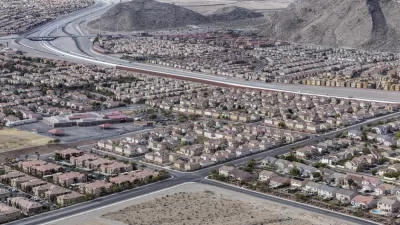The southeast Texas city is responding to community demands for safer, more accessible, and more diverse transportation choices.

Sugar Land, Texas,is adopting a new Mobility Master Plan aimed at aligning the goals and proposals in prior mobility, roadway, and bike and pedestrian plans and improving mobility for all types of road users in the sprawling, heavily car-oriented city southwest of Houston.
An article in the Fort Bend Independent quotes the master plan, which states:
For decades Sugar Land has successfully invested in mobility, primarily by building new streets and trails and increasing vehicular capacity.
To complement these investments, the community has asked the City to expand safe, healthy, and active transportation choices for all users, and continue to deploy mobility technology and update design treatments to optimize the space on existing streets.
The plan highlights the interconnectedness of transportation and land use policies, noting that “City staff should integrate public health considerations into all facets of transportation decision-making. This includes expanding greenspace for healthy activities, improving air quality, and ensuring that everyone can access their day-to-day destinations without a car.”
According to the plan, “the City must strategically re-imagine existing street corridors, build on innovative Intelligent Transportation System (ITS) investments, and adapt existing programs and policies to meet the evolving needs of the community.”
The plan establishes six ‘mobility metrics’ and a framework for tracking progress. “This plan identifies focus corridors for investment in a connected Transformative Mobility Network (TMN). Alongside this network, targeted Strategies & Action Items detail the projects, programs, and policies for the City to pursue over the next decade.”
The plan adds, “This Strategy supports further investment in the existing demand response and park & ride services within Fort Bend County while also exploring other options, including microtransit, that support connectivity and access for Sugar Land residents, businesses, and commuters.” As part of the city’s goal to provide more transportation options, in May, the city applied for a grant from the Houston-Galveston Area Council (H-GAC) to establish an on-demand microtransit pilot program.
FULL STORY: Sugar Land Reimagines The City’s Future With A New Mobility Master Plan

Planetizen Federal Action Tracker
A weekly monitor of how Trump’s orders and actions are impacting planners and planning in America.

Congressman Proposes Bill to Rename DC Metro “Trump Train”
The Make Autorail Great Again Act would withhold federal funding to the system until the Washington Metropolitan Area Transit Authority (WMATA), rebrands as the Washington Metropolitan Authority for Greater Access (WMAGA).

The Simple Legislative Tool Transforming Vacant Downtowns
In California, Michigan and Georgia, an easy win is bringing dollars — and delight — back to city centers.

Supporting Cycling Takes More Than Just Bike Lanes
Safe, protected bike lanes are a key part of a city’s bike infrastructure — but secure parking, e-bike charging, and other amenities can also influence people’s shift to cycling.

Judge Blocks Anti-DEI Rules for Transportation, Housing Grants
A second injunction blocks the Trump administration from enforcing new regulations for federal funding.

Unhoused People in San Jose Could Face Arrest if They Refuse Shelter
A policy proposed by the city’s mayor would give law enforcement the option to arrest homeless residents if they refuse three offers of housing.
Urban Design for Planners 1: Software Tools
This six-course series explores essential urban design concepts using open source software and equips planners with the tools they need to participate fully in the urban design process.
Planning for Universal Design
Learn the tools for implementing Universal Design in planning regulations.
Smith Gee Studio
City of Charlotte
City of Camden Redevelopment Agency
City of Astoria
Transportation Research & Education Center (TREC) at Portland State University
US High Speed Rail Association
City of Camden Redevelopment Agency
Municipality of Princeton (NJ)





























